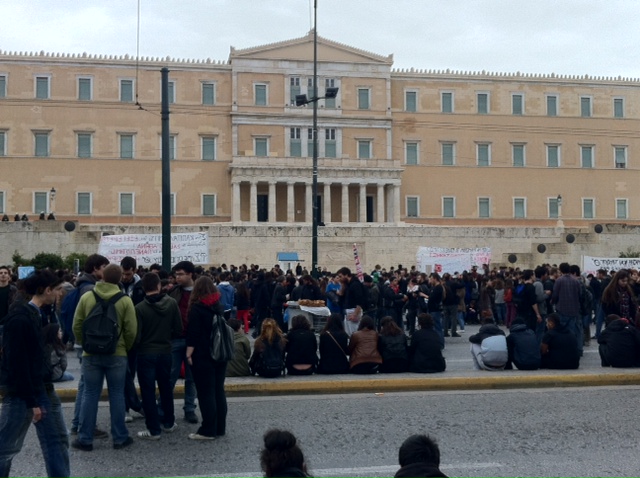Anastasia Balezdrova
Several hours after the talks of the government with the representatives of Greece’ lenders broke off, Athens became the scene of a number of protests. Students, shipping workers and archaeologists with temporary contracts "conquered" the streets but without serious clashes with the police.
The most massive was the students’ procession. Over 3,000 people from universities and colleges in Athens, Thessaloniki, Patras, Chalkis and even from the Aegean University gathered outside the Athens University and shortly after that, their procession set off to the parliament.
They were protesting against the "Athens" plan, which is to reform higher education, whereby many faculties and even schools in the country will be merged with others or closed.
The students were holding slogans with the message: "The "Athens" plan will not be applied" and "Listen to what the students are saying: Free education and securing food and lodgings for all."

When the procession reached the parliament building, a group of youths pushed the iron fence that had been placed there for security reasons. The protest ended shortly afterwards. Their teachers also urged the ministry to suspend the implementation of the plan in a letter to its leadership.
From the morning, their colleagues, who are members of the student organization of the Communist Party MAC, had blocked the entrance of the ministry and stayed there for hours with the intention of thwarting its normal functioning throughout the day.
They brought down the iron door and said they would invade the building, if the minister did not come down to meet with them. Their request was accepted and a delegation of students met with Konstantinos Arvanitopoulos.
The traffic in the centre of Athens had been blocked since early morning due to the protest of the employees in the shipbuilding industry. They held a 24-hour strike demanding the solving of all issues related to labour rights and salaries. After the meeting of trade unionists with representatives of the Ministry of Finance, the employees in the shipbuilding industry have announced a new protest for 20 March and a general strike of the employees in the industry on 28 March.
Archaeologists with temporary contracts, which will not be renewed, held a strike as well. They also protested against the closure of the Ministry of Culture and the new payroll table, which provides for a reduced number of the staff.
The demands of each protesting group might seem different, but the main motive is the same - no implementation of changes and reforms. Meanwhile, the International Monetary Fund has issued an official announcement concerning the failure of the supervisory Troika’s meeting with Prime Minister Antonis Samaras, which reads,
“Staff teams from the European Commission, the ECB and the IMF have conducted discussions with the Greek authorities during the last two weeks regarding the review of Greece’s economic programme. Significant progress has been made but a few issues remain outstanding. As additional technical work will be necessary to settle these issues, the mission will take a short break to allow this work to be completed. The mission plans to return to Athens in early April to continue its work.”
Sources say that the main obstacle of the negotiations is the layoffs in the public sector of which there has been much talk and no action, the other open "fronts" being the loans in the red, the tax liabilities and the taxation of real estate.